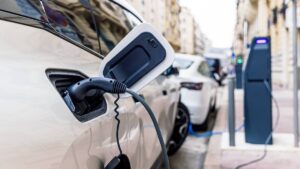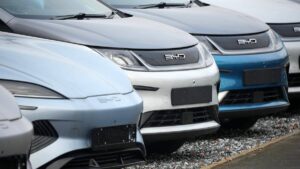It’s China EV Week: Xpeng and Didi just became an item; BYD officially a World Top 10 automaker

Via Getty
Yesterday (Monday) I said – in a rather smarty-pants tone – that this week’ll be a good one for seeing under the hood of China’s adolescent electric vehicle (EV) industry, and whether its time to shine or shut up for another three months.
A few hours later and it’s one for the Shine clique.
Because the Chinese EV maker Xpeng has locked in a deal to acquire the smart electric car development business owned by its northern rival in the ride-hailing-verse, the Beijing-based Didi Chuxing.
The unexpected love-in between the electric vehicle maker and the ride-hailing platform will see Didi betting on itself by accepting an exchange of shares worth circa US$750 million.
In return, the Chinese Uber will become a strategic shareholder of Xpeng, and the two will start acting as one when it comes to strategic marketing, getting into financial and insurance services, EV charging, all those robo-taxis and most importantly a cohesive international rollout.
Xpeng – based down in the southern capital Guangzhou – will issue the shares at HK$64.03 apiece to pay for the business
Didi which is still digesting an 8 billion RMB (US$1.1 billion) fine from the local regulators for ‘data violations’, will own 3.25% of Xpeng’s enlarged capital.
The deal, via details available on exchange filings, allows Xpeng to take advantage of Didi’s business platforms to promote its vehicles while helping Didi dodge the cutthroat market before its designed models go into production.
Xpeng Motor’s shares rose more than 12% before lunch was taken in Hong Kong on Monday, in a sign of how EVs are reshaping the investment sector as much as the auto industry. Xpeng ended 11% higher around HK$72.50 in Hong Kong, driving the Hang Seng index to a +1% gain.
The latest move continues Xpeng’s race for scale. In July Volkswagen pumped circa US$700 million into Xpeng in return for a significant 4.99% stake.
Volkswagen, already one of the more established European car names across China, will help Xpeng deliver 2x VW-badged EVs for Chinese drivers by 2026.
Cheng Wei, Didi’s chair and CEO, released a statement on Monday pledging Didi will “deepen our cooperation with Xpeng in multiple areas, driving transformation of the transportation and automotive industries”.
The move marks Xpeng Motors’ latest effort to expand its product lineup and extend its brand reach into the fleet market. The alliance is expected to help Xpeng significantly reduce costs and generate economies of scale in the production of highly autonomous cars.
For his part, He Xiaopeng, Xpeng’s co-founder and CEO, said the EV start-up will look to collaborate with Didi in particular spaces, where the two buds can pool resources and secure “a leading position in the future of mobility”.
He said on Monday he anticipates annual sales for an upcoming model, co-developed with Didi Chuxing under a new brand, to clock 100,000 units.
“Both parties will explore cooperation opportunities in various areas. Xpeng will continue to create value and capture growth opportunities in the mobility ecosystem as well as in autonomous driving.”
That’d be welcomed with open arms by Beijing and they’ll do what they can to aid and abet He’s ambitious goals.
China’s industrial profits fell 6.7% in July from a year earlier, a smaller profit decline than previous months but still an ugly extension of this year’s slump and a sign of slowing momentum for the nation’s economic recovery.
Earnings fell 15.5% for the first seven months of this year, easing from a 16.8% decrease a year earlier, according to the increasingly untrustworthy National Bureau of Statistics (NBS) which dropped the numbers only in Chinese on Sunday.
With Bloomberg Green suggesting this week that the EV sales curve has passed a critical moment, signalling the imminent explosion of EV adoption rates around the world, the time to play for market share and pole positioning is now.
By this time last year 19 countries had passed their critical EV tipping point which is 5% of new car sales powered only by electricity.
“This threshold signals the start of mass adoption, when technological preferences rapidly flip,” Bloomberg noted.
Today those 19 markets have reportedly been joined by the Canucks, Spain, Thailand, Hungary – and somehow – Australia, alongside early adopters including the US, China and the better part of western Europe.
Bloomberg’s analysis suggests the trajectory laid out by these early adopters shows how EVs can surge from 5% to 25% of new cars in just four years.
A few days ago it became clearer where a lot of those sales were originating, when, breezing past big old Euro names like Mercedes-Benz and BMW into the world’s Top 10 biggest car companies by sales volume was Elon Musk’s emergent rival, China’s BYD.
BYD barged its way into that elite Eurocentric club for the first time as global new vehicle sales grew 96% on the year to 1.25 million in the first half of this year, putting it in 10th place behind Japan’s Suzuki according to the auto-research company MarkLines.
The Tesla-Tormenting Chinese EV groundbreaker (BYD – Build Your Dreams) ranked just 16th in sales last year and didn’t even make the top 20 in 2021.
After ditching petrol engines, BYD has gone on to capture strong market share by expanding its lineup both at the low and high ends, with a focus on EVs and a variety of plug-in hybrid EV models which have been happily snapped up by local drivers.
Of course, BYD has been busy slashing costs in the unique segment of its business that makes other EV makers salivate – in-house lithium battery production.
BYD, alongside the state-backed lithium battery-making monster CATL, make their own EV energy sources. And now BYD says its batteries are produced at $US60 million per gigawatt hour, according to Bernstein analysts, against $US88 million/GWh for LG and SK, over at the biggest comparable Korean producer. Next best, at Japan’s Panasonic, it costs more than $US100 million/GWh.
Until Xpeng’s announcement, Chinese EV stocks have given back some bullish buying during July. One can pin that on Elon a bit.
Tesla’s (TSLA) been the instigator of several desperate and intensifying price wars in China’s domestic EV-verse. That’s probably done good by demand, but with the dark and brooding fiscal, macroeconomic, geopolitical skies all around, one wonders what’s going to come out when the margins are measured.
Geely (GELYF), Great Wall Motor (GWLLF), Volkswagen (VLKAF) and NIO (NIO) have all partaken in the firefight, but it’ll be NIO (NIO) that sets the tone. This week a slew of industry data drops including the monthly deliveries reports for the major China EV players emerge on Friday, while NIO (NIO) drops its earnings on Thursday.
Related Topics
UNLOCK INSIGHTS
Discover the untold stories of emerging ASX stocks.
Daily news and expert analysis, it's free to subscribe.
By proceeding, you confirm you understand that we handle personal information in accordance with our Privacy Policy.








